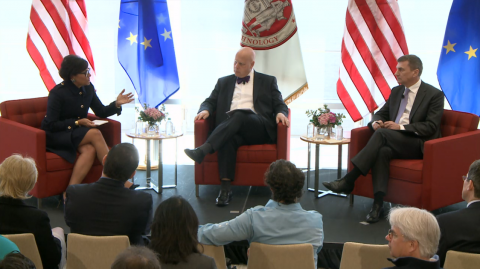Mar112016
Posted at 1:45 PM
Our country and the entire world are living through one of the most remarkable economic and societal transformations in history and it is being driven by technology. In this changing world, economic growth and competitiveness are increasingly tied to the digital economy. This technology revolution has been dramatic.
Ten years ago less than 18 percent of the world’s population had access to the Internet. Last year roughly 3 billion people—approximately 43 percent of global population—were online. This is phenomenal growth, and the pace of change is continuing.
The digital economy has a staggering impact on U.S. growth and economic opportunity. Consider this fact: In 2014 the United States exported roughly $400 billion in digitally-deliverable services, accounting for more than half of U.S. services exports and about one-sixth of all U.S. goods and services exports. One study recently reported that the Internet economy already represents over 5 percent of U.S. GDP. Additionally, in G-20 developed markets the Internet economy is expected to grow at an annual rate of 8 percent over the next five years, far outpacing just about every traditional economic sector.
For many people, the digital economy will be the best place to find their next job or business opportunity. In 2013, 60 percent of unemployed American Internet users ages 15 and older used the Internet to search for a job.
The Commerce Department is committed to ensuring the digital economy continues to thrive and grow, for everyone. America’s economic growth and competitiveness depend on our capacity to embrace digitization in the economy.
Specifically, we have rolled out an agency-wide Digital Economy Agenda that supports the transformative impact of the Internet and reflects its role as a global platform for communication, commerce, individual expression, and innovation. This initiative builds on the work of the Department’s 12 bureaus and nearly 47,000 employees and is focused on four key pillars.
1. A free and open Internet
A free and open global Internet, with minimal barriers to the flow of data and services across borders, is the lynchpin of the digital economy’s success. It enables workers and businesses to market their wares, connect with customers, and increase their skills. That open Internet is now threatened by new barriers to cross-border information flows, erected by governments and other interests through data localization rules, platform regulation, and security policies.
2. Trust and security online
The digital economy cannot succeed if businesses and consumers do not trust their security and privacy online. American business needs a framework at home that will promote global trust, and international rules that do not unfairly burden American firms.
3. Access and skills
American businesses need broadband infrastructure and a skilled workforce to compete. Yet broadband deployment remains uneven and more than 25 percent of U.S. households still do not use the Internet from home. American workers will need new skills and tools if they are to share in the prosperity offered by the modern digital economy.
4. Innovation and emerging technologies
The pace of technological change is only increasing, bringing both opportunity and disruption. Commerce aims to increase its capacity to engage in new technologies, such as autonomous cars and unmanned aircraft, early in the development life cycle to break-down barriers and address long-term policy concerns.
While the digital economy offers great opportunity, we face challenges too.
Governments around the world are increasingly pursuing policies that could restrict the free flow of information on the Internet.
These policies, such as data localization requirements, present significant risks to the competitiveness of both U.S. and foreign firms globally. The recently announced EU-U.S. Privacy Shield Framework is just the latest example of the importance of digital economy issues. For companies across all sectors of the economy – not just digital economy and Internet companies – effectively addressing these potential regulatory and trade barriers is the kind of export assistance they need the most.
To respond to these needs, as the U.S. Government’s primary advocate for business, the Commerce Department has made promoting U.S. digital commercial interests a top priority. So I am pleased to announce today that we are launching a pilot program of ‘Digital Attaches’ in order to ensure that U.S. companies can participate in the global digital economy and reach markets worldwide.
The primary goals of the Digital Attachés, members of our Foreign Commercial Service of commercial diplomats, will be to provide support and assistance to help U.S. businesses successfully navigate digital policy and regulatory issues in foreign markets and expand exports through global E-commerce channels.
This initiative will be led by the Department of Commerce’s International Trade Administration, working with bureaus across the Department of Commerce, in collaboration with the Department of State and our industry stakeholders. This initiative will enhance efforts to advance commercial diplomacy, drive policy advocacy on technology issues, ensure linkages between trade policy and trade promotion efforts, and provide front-line assistance for U.S. small and medium enterprises to take advantage of the robust e-commerce channels.
The Commerce Department’s commercial service mission is to support American businesses, promote trade, and ensure that all companies have access to a fair and competitive marketplace. The Department looks forward to using the new attaché program to partner with the private sector in advancing this mission for the evolving digital economy.



